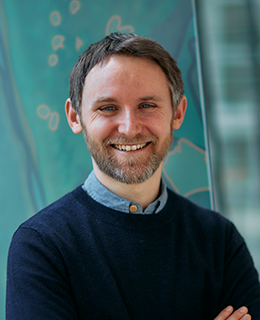Dunn School appoints new Associate Professor of Biochemistry

Currently a Wellcome Trust Senior Research Fellow in the Institute of Structural Molecular Biology at Birkbeck/UCL, Anthony will be joining the Dunn School alongside the position of Berrow Foundation Lord Florey Fellow in Biochemistry at Lincoln College.
The Roberts lab uses structural biology, cell biology and single-molecule techniques to investigate how motor proteins create spatial organisation and movement within eukaryotic cells. The group focuses primarily on dynein and kinesin, ATP-powered, microtubule-based motors that transport components within cells. One of the current goals is to understand how dynein and kinesin work together to form bidirectional transport systems, particularly in the context of cilia and flagella. Defects in this transportation system cause a variety of human disorders.
Anthony Roberts studied biochemistry at Imperial College London, UK, followed by a PhD at the University of Leeds with Peter Knight and Stan Burgess, where he studied the mechanism behind dynein’s motor activity. This was followed by a postdoc with Samara Reck-Peterson at Harvard Medical School, focussing on cytoplasmic dynein regulation. In late 2014 he returned to London to start his independent group at the Institute of Structural and Molecular Biology at Birkbeck, University of London, and University College London (UCL), initially funded by a Sir Henry Dale Fellowship. Anthony received the Biochemical Society Early Career Research Award in 2016 and was elected to the EMBO Young Investigator Programme in 2018.
On his new appointment at the Dunn School of Pathology, Anthony said “I am absolutely thrilled to be joining. Through our research, I look forward contributing to the Dunn School’s mission of discovering the molecular and cellular mechanisms that underlie human health and disease.”